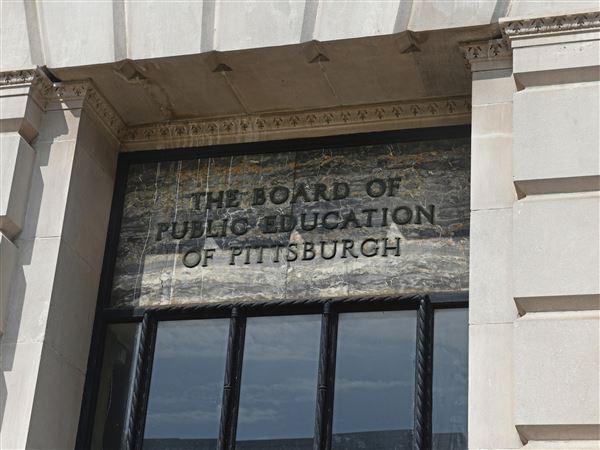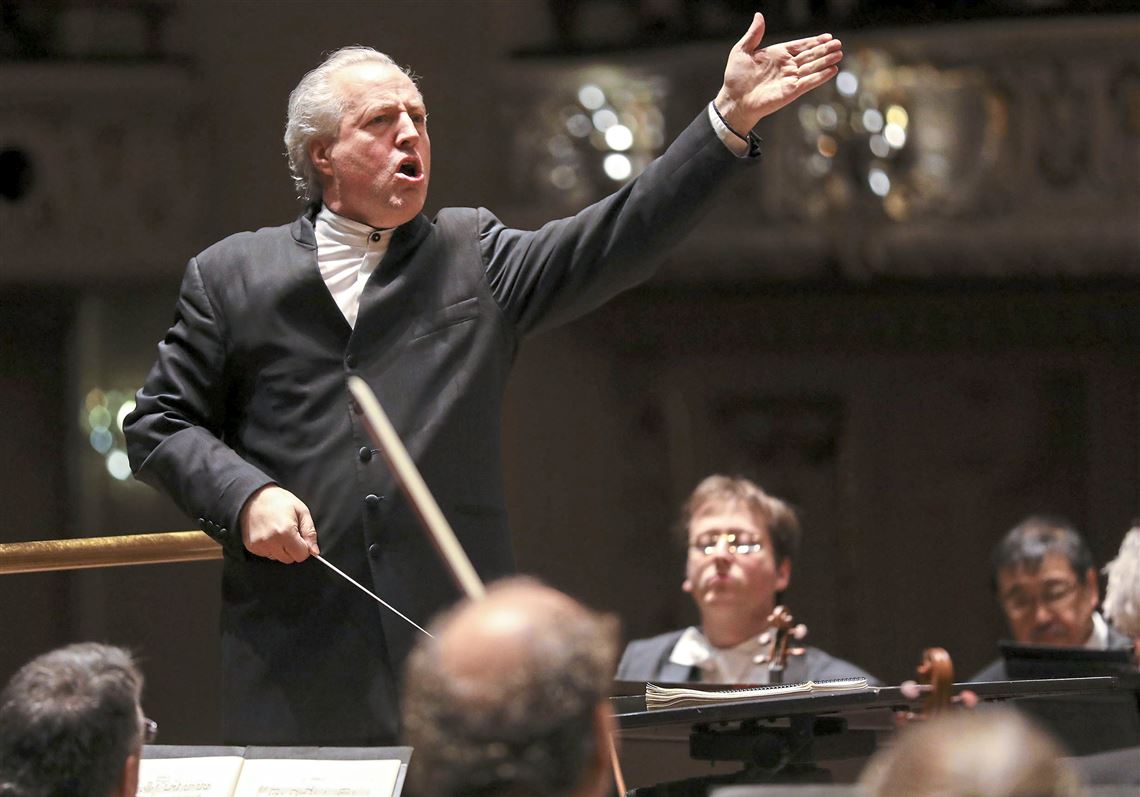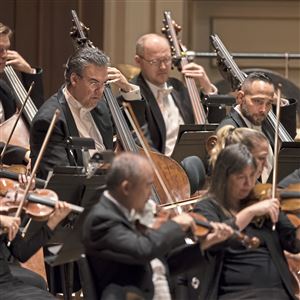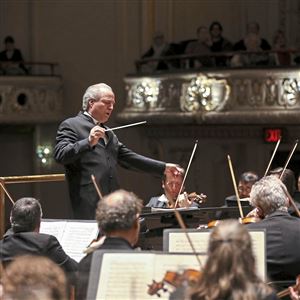Everyone knows the old adage about getting to Carnegie Hall by practice, practice, practice. But how do you become a board member for the Pittsburgh Symphony Orchestra?
Moolah, moolah, moolah.
The Pittsburgh Symphony Board asks board members to provide or secure roughly $25,000 for the orchestra each year. The PSO board currently has just over 50 members, and in September the organization elected a new board chairman to lead for the next three years.
Anthony (Tony) Bucci is a Pittsburgh-grown executive. He’s the president of MARC USA, an advertising company with branches in Chicago and Boston. He’s also served on several other Pittsburgh arts boards over the years. While the PSO searches for a full-time communications manager, Mr. Bucci’s company is assisting the orchestra’s communications efforts at a reduced price.
In an interview last week, Mr. Bucci talked about how he plans to bring his advertising acumen to bear in his new role. He had just returned from a League of American Orchestras conference. Below is an edited version of that conversation.
What is the greatest challenge facing the PSO in coming years?
Before, we played music and people came. We opened the doors and they just showed up. That world doesn’t exist anymore. I can’t tell you the number of people that I meet who have no idea that the Pittsburgh Symphony Orchestra is one of the best in the world. It stuns me how few people realize that.
Your solution?
We need to be much more outgoing in how we talk about what we do, how we do it, what our value is and why we do it. We need to highlight more of our community initiatives, like going out and playing and raising money in Wilkinsburg and the Hill District, all of the performances for thousands of school kids every season, the sensory friendly concerts, the partnership with City of Asylum and so forth.
It’s about becoming more relevant to the community. Are we just playing dead white European men’s music? Well, yeah. But do we need to think about broadening our repertoire, not losing what we have but adding to it? Yes we do. Those are conversations that have to happen and are just beginning to happen.
Other orchestras have been having those conversations for years.
True. Pittsburgh’s programming is very traditional. Your music director has tons to do with this, and you bring guest conductors in. They also influence the programming. The question becomes one of balance: How do you curate the really good new stuff? I loved that Mason Bates premiere [“Ressurexit” in September].
Speaking personally, I think you need to balance the repertoire, but looking more contemporary is essential for the future of the orchestra. I think people enjoy it if it’s good stuff. I think the trick is to hold what you have and add to it.
That’s quite a trick.
Take things like the movies we’ve been programming — “Star Wars,” “Harry Potter,” Tim Burton’s movies and so on. These pack the hall! And a large majority of those huge audiences have probably never even been in Heinz Hall, much less gone to a symphony concert. You just see the energy in there. And you realize we can do this. When’s the last time you’ve seen the energy level at a classical concert?
Maybe Yo-Yo Ma’s performance in June?
Yes, there are a few people that can bring up that much energy. I’ve been making the observation — every other musical experience any of us have, be it jazz at a club, rock at a rock show — people play a nice solo and boom! People start clapping.
You want more audience participation?
This is the only experience where you’re not allowed to clap or, God forbid, you clap at the wrong time. It’s totally contrary to every other musical experience any of us has. So if you wonder why it appears elitist or uncomfortable, maybe we need to think about that. I love that Manfred [Honeck, music director of the PSO] and the other musicians say they welcome reactions, but when you’re in that hall it’s like … who’s going to be the first one to actually do it?
I’ve written about this — it’s actually the audience members themselves that want to hold onto that tradition. That said, I’ve been tempted to applaud between movements myself.
Me too! I keep thinking I should do it. And this is just one example. These are real things we have to think about. We’ll get there. And the thing is there’s not really resistance. It’s more that nobody’s sure how to do it.
We’ve got this building full of creative minds.… Let’s come up with something creative. We need to make our product relevant and exciting to our community so they want to be a part of it. I think of the program we did last summer in the Hill District with Monica Ellis. I want us to do more of those. And they can’t be one-offs, they have to be part of the fabric of the organization. Over time they become a part of the fabric of the organization and you move forward. It has to be very purposeful, and not occasional. Easy say, hard do.
The hope being that becoming more relevant will result in more people in the hall and more donations?
Ultimately, yes. In this business you gotta raise a lot of thousand dollar gifts in addition to keeping hold of the big donors and big corporate givers. You have to go after both.
How is the symphony faring financially?
We completed our challenge funding goals a year ahead of schedule, which is great. But at the end of the day we need a sustainable solution. That’s the real challenge.
You mentioned retargeting corporate sponsorships previously?
Oh yes. These days there are fewer big corporations in the city, and they’re being led largely by people who’ve been brought in from the outside. Most of these corporations have foundations, but these foundations are focusing less on the arts and more on human services.
We need to reframe what our place is in the community, why we’re important to them, to their employees, to their recruitment … why we are relevant to them with the touring we do nationally and internationally We become a human service when we go out into communities and raise money.
What companies are you talking about?
I want to start looking at the big companies that fly under the radar in Pittsburgh, the ones that have substantial work forces that aren’t being tapped yet. We need to broaden our view of who we can show our value to.
I’ve been making a list. There’s a company called CP Industries in McKeesport, a steel drum manufacturing company. Expedius is another — it has more than 150 employees. There are tons more like this. I bet I could easily make a list of 50.
We need to rethink who we’re pitching to. There are too many people that think: “Man, do we really need an orchestra that good if we can’t afford it? Isn’t good enough good enough?” That’s our problem. We have to educate people on why it’s important to invest in an orchestra like this. What’s the return on the investment?
Seems like a reasonable question. What’s your elevator pitch?
I usually jump into a whole conversation about the economic value that we bring. When I took over MARC, we were a Pittsburgh-only company. I knew at the time there wasn’t enough business in Pittsburgh to sustain us. I decided to go sell our services around the country.
I can remember going around the country and saying “I’m from Pittsburgh,” and people’d say, ‘Why the hell would I want to go to Pittsburgh?” Now people say, “Oh my God, Pittsburgh it’s the hottest city in the country right now.”
As the profile of the city increased — thank you CMU, thank you hospitals and banks, thank you tech companies — when Pittsburgh began being written about as this center of brilliance and excellence, it created this halo around me trying to sell my services outside the city. The symphony is part of that. What this orchestra has to do is insert itself into that conversation about excellence and brilliance.
How do you get an orchestra into that conversation?
Well, this isn’t a political conversation. But if we’ve learned anything in the last two years, if you say something over and over and over again it becomes a fact. Either side. Be loud, be consistent. The good news is the conversation about the symphony is based in fact.
Makes sense to me.
Sure. If I want to see the best Broadway show I go to Broadway. I love the CLO [Civic Light Opera]. I’m on the board, and they do great work. But if I said I want to see the best there is, I’m going to London or I’m going to Broadway.
The Pittsburgh Symphony Orchestra is the only arts organization — and I gotta be real careful, they’re all my friends — where if you want to experience the best the world has to offer, you go down to Sixth and Penn. It’s right there.
Jeremy Reynolds: jreynolds@post-gazette.com or 412-263-1634; twitter: @Reynolds_PG. Mr. Reynolds' work at the Post-Gazette is supported by a grant from the San Francisco Conservatory of Music, Getty Foundation and Rubin Institute.
First Published: October 25, 2018, 12:00 p.m.


















